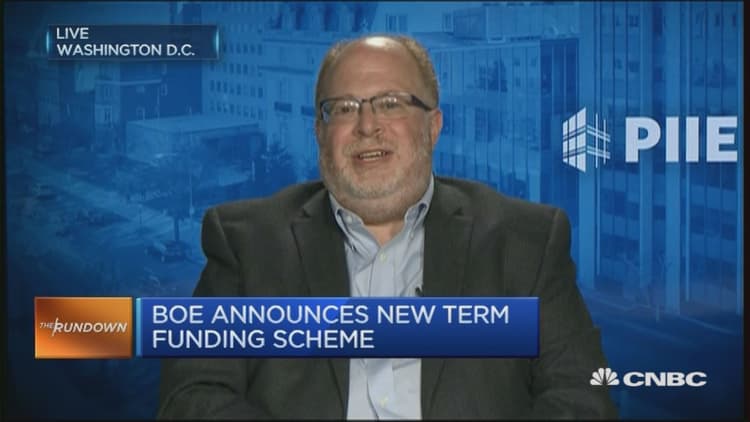
The Bank of England's new Term Funding Scheme won't work as demand for loans remained weak and banks were still under-capitalized, a former rate-setter said Friday.
Banks will be offered up to 100 billion pounds ($131 billion) in cheap funding for four years as part of the new plan to encourage them to lend to consumers and businesses. But Adam Posen, president of Peterson Institute for International Economics, and a member of Monetary Policy Committee of the Bank of England (BOE) between 2009 and 2012, said he wasn't sure the plan would succeed.
"You're still pushing on a string. Banks will simply refuse to take the extra reserves because there is no demand for the loans," Posen told CNBC's "The Rundown".
"This isn't 2008 or 2009 when there was a liquidity problem and banks were desperate to get their spreads down and get liquidity back," he said.
Posen said another reason why the plan may not succeed was that regulators didn't want banks' capital positions to weaken. Despite the belief that the financial health of banks had improved, many lenders remained under-capitalized, especially in the U.K., he said.
BOE Governor Mark Carney and the financial policy committee were "making a dangerous move" by encouraging lending, considering real estate prices in the U.K. were already inflated, Posen said.
The BOE's new plan was part of a broad suite of measures announced Thursday to limit the contagion from the U.K.'s decision to leave the European Union (EU). The central bank slashed its benchmark rate for the first time in seven years to a record low of 0.25 percent and announced another round of quantitative easing.
The central bank also slashed its economic growth forecasts and Posen added that the referendum vote was a real shock to the U.K. economy.
"It's about the real ability of different companies to compete The access they have to particular markets, the trade patterns, the competitiveness," Posen said.
"It's not about a financial panic, a lack of liquidity, a tightening of credit conditions. So monetary policy can only do so much."

